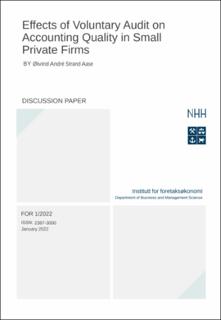| dc.contributor.author | Aase, Øivind André Strand | |
| dc.date.accessioned | 2022-01-10T11:36:55Z | |
| dc.date.available | 2022-01-10T11:36:55Z | |
| dc.date.issued | 2022-01-10 | |
| dc.identifier.issn | 2387-3000 | |
| dc.identifier.uri | https://hdl.handle.net/11250/2836707 | |
| dc.description.abstract | Many countries have introduced thresholds for mandatory audits, but empirical evaluations on how deregulation of audit markets affect reporting quality are scarce. I analyze a Norwegian audit reform in 2011, that introduced voluntary audit for small private limited liability firms. I find no consistent signs of negative effects on accounting quality for the firms that drop audit. Some firms around the size thresholds size down to avoid audit costs when the perceived benefits of audit are smaller than the costs. If such downsizing is done by manipulation of the accounts, one would expect lower accounting quality among firms just below the threshold. I find some indications of lower accounting quality among these firms, but the finding is not robust. I conclude that the reform has not had significant negative effects on accounting quality and that deregulating certain segments of the audit market – entrusting the audit decision to be taken by firms based on their individual cost-benefit assessments – increase economic efficiency. | en_US |
| dc.language.iso | eng | en_US |
| dc.publisher | FOR | en_US |
| dc.relation.ispartofseries | Discussion paper;1/22 | |
| dc.subject | Voluntary audit | en_US |
| dc.subject | private firms | en_US |
| dc.subject | size management | en_US |
| dc.subject | revenue threshold | en_US |
| dc.title | Effects of Voluntary Audit on Accounting Quality in Small Private Firms | en_US |
| dc.type | Working paper | en_US |
| dc.source.pagenumber | 33 | en_US |
